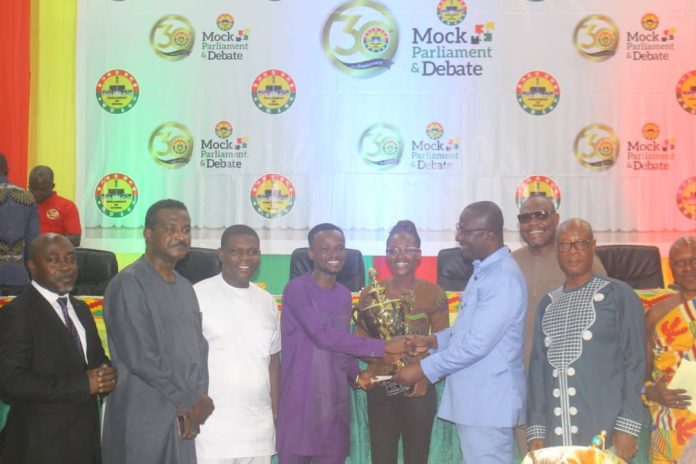Politics
Be tolerant with democratic flaws – Second Deputy Speaker

The Second Deputy Speaker of Parliament, Mr. Andrew Asiamah Amoako, has implored citizens, especially the youth, to be tolerant with Ghana’s fledgling democracy, irrespective of the challenges it presents.
He said the issues might not be going as desired, but the youth must exercise restraint in their actions and comments, which could truncate the country’s democracy.
“Nobody is saying everything is perfect, but it is a process. We are correcting ourselves each day and therefore, it is better we all agree with this dispensation we find ourselves in rather than allow some few miscreants, who think they are the only people with the knowledge and whatever it takes to rule the country,” he said.
Mr. Amoako, the Member of Parliament (MP) for Fomena, was speaking at the Mock Parliament and Debate organised by the Legislature at the University of Cape Coast (UCC), on Wednesday.
It seeks to educate students to understand the work of Parliament, help them to develop tolerance for the views of others, and respect for rule of law, among other things.
The event formed part of activities marking the 30th anniversary of uninterrupted democratic dispensation in Ghana and seeks to enlighten the public on the role of Parliament and how to improve the political system.
Mr. Amoako said the of youth deserved decent living, hence governments, since 1992, had been rolling out programmes to meet their needs.
“Even though things might not be the way we want, let’s be patient and tolerant and allow this dispensation to go on,” he implored.
The recent political disturbances by security forces in some neighbouring countries were a signal that Ghana was not immune to military interference, he observed.
To forestall a similar situation in Ghana, he said the citizenry must be strengthened to have faith in democracy and be made aware of the dividends it presented.
“The sustenance of our parliamentary democracy requires continuous education and public awareness on the significant development to our nation,” Mr. Amoako said.
“Citizens, particularly the younger generation, must have efficient knowledge about the history of the political governance of this country and why the forebears of the Fourth Republic have chosen the path of constitutional rule and not any other one.”
He urged the clergy to pray for Ghana and her leaders to be truthful and sincere to their call.
He commended the young debaters and the mock parliament for the display of talent and the demonstration of their readiness to take up the mantle of leadership to shape the country’s future.
Mrs. Justina Marigold Assan, the Central Regional Minister, gave reasons why the 30 years of democracy in Ghana must be celebrated, citing the enormous role it had played in its development.
She commended Parliament for the feat achieved under the Fourth Republican Constitution, including the passage of more than 1,000 bills such as the Electoral Commission Act, Presidential Transition Act, and the repeal of the Criminal Libel Law to strengthen Ghana’s democracy.
However, she urged Parliament to take deliberate action to increase women representation because they were woefully underrepresented.
“Let us all re-dedicate ourselves to making parliament more vibrant and let us continue to have the interest of the people at heart,” she said.
Mrs. Assan expressed satisfaction with the mock parliament and indicated her confidence in the youth to give Ghana a bright future.
UCC beat the Cape Coast Technical University (CCTU) and the Takoradi Technical University (TTU) to emerge the winner in the exciting and fun-filled debate.
It was on the topic: “Smart phones and Artificial Intelligence are making students and researchers lazy. True or false?”
TTU emerged second, followed by the CCTU.
Source: newsghana.com.gh



Mahama leads NDC to mourn with Kufuor over wife’s passing
Former President John Dramani Mahama on Wednesday, October 4 led a delegation from the National Democratic Congress (NDC) to visit...


Former First Lady of Ghana Theresa Kufuor reported dead
The former First Lady of Ghana and wife of Ghana’s former President, John Agyekum Kufour, Mrs Theresa Kufuor has been...


The most powerful tool for change is the right to vote – Mahama
The 2024 flagbearer of the National Democratic Congress (NDC), John Dramani Mahama, is rallying Ghanaains who have grown disillusioned with...


PFJ was a mere state resource looting platform – Minority
The Minority has descended heavily on the Akufo-Addo-led government for launching a second phase of the flagship Planting for Food...


ECOWAS is desecrating Ghana
The Director of Legal Affairs of the National Democratic Congress (NDC), Mr Abraham Amaliba has said the Economy Community of...


Prof Gyampo elected President of UTAG, University of Ghana branch
A Senior Lecturer at the Political Science Department of the University of Ghana (Legon), Prof Ransford Gyampo have been elected...
